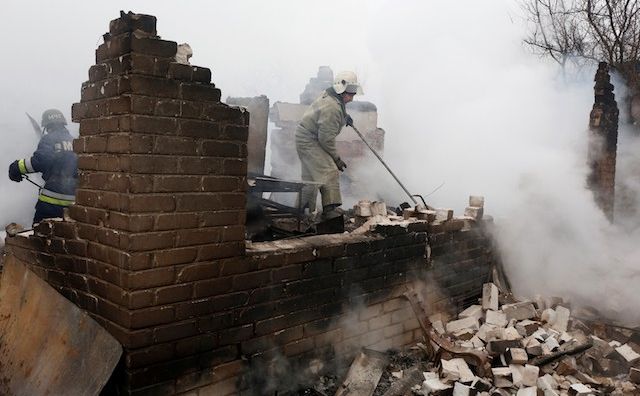Wars no longer between states
Warfare has entered a stage where the parties engaged are no longer easily recognizable as states. Some security experts have even gone so far as to say that the era of war between states has come to an end and that this is a good thing. The latter is a very dubious claim.

In a nutshell
- While wars officially fought between states may be ending, the number of armed conflicts is on the rise globally
- Combatants in proxy wars show no respect for international treaties and conventions, complicating postwar reconciliation
- Russia often resorts to creating “frozen conflict” areas to permanently destabilize neighboring states
By tradition, wars have been fought between states. In the glory days of “honorable” warfare, armed clashes were preceded by official declarations of war, at times even by agreement on where and when to meet. Those days are long gone. The practice of formally declaring war was made obsolete by World War II and the benefits of surprise attack have since totally eclipsed any notion of honor in the combat-starting business.
More recently, and more fundamentally, warfare has entered a stage where the parties engaged are no longer easily recognizable as states. Some security experts have even gone so far as to say that the era of war between states has come to an end and that this is a good thing. The latter is a very dubious claim.
The implication of wars that are no longer fought between states is that the warring parties may no longer be counted upon to respect international treaties and conventions, nor to stand ready to shoulder the burden of postwar reconstruction and reconciliation. These observations have profound implications for the future of the global order.
Non-state actors
The gravity of the matter is brought home by the fact that while the era of wars between states may indeed be coming to an end, the number of armed conflicts is on the rise, as is the number of casualties and the number of states involved, not to mention the volume of arms sales. We are thus witnessing a rise in violence that is accompanied by a decline in the relevance of mechanisms to control and constrain that violence.
The most obvious deviation from the tradition of warfare between states is the entry of non-state actors that possess significant military capabilities. As evidenced by Daesh (ISIS) and Boko Haram, terrorism has evolved from small groups attacking single targets to large organizations imposing semi-state control over territories, which they subject to taxation, conscription and Sharia legislation.
The Kremlin is heavily involved in supporting a de facto separation of parts of Donbass from Ukraine.
Such quasi-states are likely to be a transient phenomenon. When faced with the full military might of the major powers, any ambition by non-state actors to control territory will come up short. Although the rise and fall of Daesh has been associated with tremendous costs, it never did stand much of a chance of becoming a permanent feature as a state. Terrorism will not vanish soon, but the “war on terror” will mainly consist of policing and intelligence gathering rather than combat operations.
Russia’s aggression against Ukraine constitutes another ominous deviation from tradition. If one looks merely at what is happening on the ground, it is hard not to conclude that this is indeed a war between two states. Although many of the insurgents in the Donbas region are locals, without the regular Russian army’s participation in combat, the insurrection would not have lasted beyond the summer of 2014.
Developments since then have included a massive buildup of heavy weapons, requiring an equally large logistics operation, and the establishment of an ambitious training and organization program for the insurgent forces, provided by regular Russian army officers. In short, there can be no doubt that the Kremlin is heavily involved in supporting a de facto separation of parts of Donbass from Ukraine, much as it has been instrumental in annexing Crimea.
Consequences of realpolitik
Both the United States and the European Union, however, have been willing to accept Russian protestations of innocence, no matter how ludicrous those claims may have been – ranging from the proposition that regular Russian army soldiers captured inside Ukraine had been there on vacation to radar images allegedly proving that Ukraine, not the insurgents supported by a Russian army missile unit, was responsible for the shooting down of the Malaysian airliner in July 2014.
There are obvious reasons why the Western powers have allowed Russia to get away with this. They boil down to realpolitik. The U.S. and other NATO members themselves have been involved in providing lethal support to non-state combatants – at present in the Middle East and Africa. Aside from that, had the Kremlin been formally branded as guilty of armed aggression against an internationally recognized state whose territorial integrity it was treaty-bound to respect, the condemnation would have made short shrift of any ambition to resolve the matter diplomatically.
If this becomes acceptable practice, many efforts to maintain a world order based on enforceable rules will be doomed.
This tactical retreat carries consequences that go far beyond recognizing that the “Normandy format” and the Minsk peace process have been doomed from the outset.
The implications of de facto accepting this form of warfare between states are more far-reaching than the already challenging cases of non-state actors and rogue states. The latter cases both can and will be resolved by armed intervention from one or more of the major powers. The case of a war that is not recognized as such is challenging in the sense that the party responsible for the aggression cannot be held to account for violations of international law. Nor can it be required to participate in reconstruction and reconciliation. If this becomes acceptable practice, many efforts to maintain a world order based on enforceable rules will be doomed.
Facts & figures
War and international humanitarian law
The first Geneva Convention was signed by 16 countries in 1864. Spurred on by the horrors of the Crimean War, the convention mandated humane treatment of wounded (regardless of which side they were on), established protection for medical personnel, and enshrined the symbol of the Red Cross as a way to identify those aiding such endeavors.
In 1899 and 1907, The Hague Conventions, mainly aimed at regulating the conduct of warfare, were also adopted. The 1899 convention included prohibitions against the use of poisons, the killing of enemy combatants who have surrendered, the looting of towns or property by occupying forces and the attack or bombardment of undefended towns. It also protected inhabitants of occupied territories against conscription and provided protection for hospital ships.
The Hague Conventions, despite being passed and ratified, failed to uphold war rules during World War I. Poison gas, for example, was used by all major belligerents.
Following that war, the Geneva Convention of 1929 established rules for the treatment of prisoners of war. The innovations included the prohibition of reprisals and collective penalties, the organization of prisoners’ work, the designation, by the prisoners, of representatives and the control exercised by “protecting powers.”
The Geneva Conventions of 1949 are the last major international treaty to deal with laws of war, treatment of prisoners and civilians, as well as the rights and responsibilities of occupying powers. It not only incorporated all the rules established in the earlier treaties but also included the United Nations and the International Criminal Court (ICC) as the regulating and arbitrating body. Three additional protocols have been passed that have updated the Geneva conventions for more modern forms of warfare.
The Geneva Conventions is the most famous and overarching set of agreements, but they do not stand alone. Since 1949, several other treaties have also been passed to provide additional protections for individuals during armed conflict: the Genocide Convention of 1948, the Universal Declaration of Human Rights of 1948, the Nuremberg Principles of 1950, and the Convention on the Abolition of the Statute of Limitations on War Crimes and Crimes against Humanity of 1968.
Frozen conflicts
It is striking that many view a “frozen conflict” as the best attainable outcome of the war in Donbas. Given the circumstances, this may well be the case, but it will be achieved at the cost of severe collateral damage. The essence of a frozen conflict is that there will be no end to the conflict. The Turkish invasion of Cyprus in 1974 is a case in point. More than four decades later, the island remains divided and the northern, Turkish part vegetates in an unrecognized limbo.
As an isolated case, Cyprus may well be something that we can live with. Russia, however, is establishing a pattern of warfare where the aggressor can deny responsibility and where frozen conflicts proliferate.
Prior to its aggression against Ukraine, Russia was responsible for sustaining the ethnically Russian enclave Transnistria within Moldova, for backing Armenia in its military occupation of the ethnically Armenian Nagorno-Karabakh enclave inside Azerbaijan, and for causing the dismemberment of Georgia by supporting the creation of Abkhazia and South Ossetia as states. The danger looking forward is that we may see similar ploys put in motion in the ethnically Russian northern part of Kazakhstan, that Turkey may follow the example by expanding its military incursions into Iraq and Syria, and that Iran and Saudi Arabia may also continue down the same road.
The end of war between states brings sinister prospects for the future of the global order.
The effective outcome of freezing rather than resolving conflicts is to create ungovernable spaces. Territories that are frozen in conflict are likely to be subjected to international blockades, which impact negatively on trade and investment and make banking operations very difficult. The areas will be ruled by illegitimate regimes that must rely on the outside patron for matters such as social services and infrastructure. They will serve as virulent trouble incubators ranging from safe havens for organized crime to expanded demand for mercenaries and gun running.
These are the reasons why the end of war between states brings such sinister prospects for the future of the global order.
Possible solutions
One approach to dealing with this dangerous trend might be to rely on the United Nations, which was created to regulate and, ideally, to prevent war between states. But the UN is marked by a built-in anomaly that limits its usefulness. The organization was created to promote values, but it can function only when there is an alignment of interests and consensus between the major powers.
The implication is that UN peacekeeping operations may succeed in some cases. Much hope was also pinned on the introduction of a “responsibility to protect” (R2P) rule (after the genocide in Rwanda), but the appetite for the R2P approach basically died with the intervention in Libya. Significantly, when the U.S. launched its invasion of Iraq, it sidestepped the UN and relied on its “coalition of the willing.” This not only antagonized several key EU partners. It also left a permanent grudge against Russia. As a result, when the interests of the major powers are at stake, the UN remains irrelevant.

An alternative approach to maintaining global order might be to rely on superior force to bring miscreants into line. This is also a dead end, and not only because the days when the U.S. could be relied upon to enforce international law and order are long gone and will not return. As is being brought home by North Korea, even huge military force can do little against rogue states with nuclear weapons. The idea of someone deterring a nuclear superpower such as Russia with a threat of military strikes is absurd.
A third, and considerably different, approach could be to create an entirely new game plan, based on extreme realpolitik and the recognition of spheres of interest. There is a considerable historical precedent to support this. Land grabs and partitioning of states have been a time-honored practice even within Europe. The Kremlin would gladly have accepted a solution to the crisis in Ukraine that entailed partition. Rumors even have it that this was suggested, at an early stage. China would also be happy to receive an international blessing for its own land grabs.
Logical but impossible
Aside from the power politics, there is considerable economic merit in arguing for realpolitik. If, for example, the international community had accepted the Turkish invasion of Cyprus, then the two parts of the island could have been opened for international trade and investment – to a degree that has now been made impossible. Similarly, if the Russian annexation of Crimea had been accepted, the peninsula would have been opened for business in tourism, energy exploitation and wine growing. And an early acceptance of detachment of Donbas from Ukraine would have precluded the vast material destruction that was to follow.
Although there is much to be gained from this approach, it remains impossible. The Western powers have invested heavily in promoting a rules-based global order. Departing from such policy on their part would result in political havoc. Minor sins, such as looking the other way in Donbas, are of course always acceptable, but outright recognition that might makes right is simply unthinkable.
Scenarios
As a result, current trends will continue, probably also escalate. The pattern of concealed aggression employed by Russia is considerably different from the prior U.S. practice of intervening to change or support regimes in distant lands. While certainly not always successful, those interventions have sought to establish friendly regimes and to create business opportunities in functioning states. The Russian approach is one where the aggressor is content with sustaining low-level military conflict, in the ambition of destabilizing a state with which it has disagreements. There is no ambition that this should be good for business, nor is there a readiness to support postwar reconstruction.
The proliferation of frozen conflicts will not only create a fertile ground for international organized crime. It will also serve to generate a growing demand for mercenaries, on hire from private military contractors. The U.S. reliance on private military contractor Blackwater USA (now known as Academi) to undertake dirty work in Iraq has provided a good deal of inspiration for Russia. Being reluctant to send conscripts into undeclared foreign wars, the Kremlin has turned to private contractors like Wagner for its operations in Donbas and in Syria, possibly also in Libya.
The implication of the trend toward diminished accountability is that military conflict moves further and further away from a rules-based global order. In so doing, it also risks becoming increasingly brutal, unconstrained by rules of war and threats of sanctions.
There is, of course, a constructive way out of this road to perdition. A greater focus on confidence-building measures could restore the constraining role of international treaties and conventions, and make a possible postwar recovery through reconstruction and reconciliation. But this can only be achieved based on a communality of interest and a sense of mutual respect between the major powers. The current climate of international relations does not seem conducive to either.





